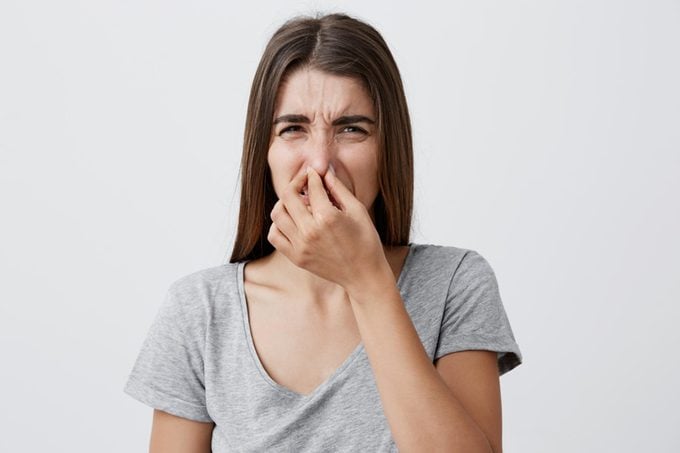10 Things You Had No Idea Were Actually Covered in Fecal Matter
Updated: Jun. 15, 2021
Everyone poops—but they should really wash their hands better afterward. Check out all the places where dangerous fecal bacteria may lurk.

Most people expect to find E. coli and other nasty feces-related bacteria in the bathroom. But those same germs can travel to places you may not expect, and where they’re definitely not welcome: cutting boards in kitchens, for example. The ick factor is extremely high, but how dangerous is fecal matter anyway? That depends.
For people with compromised immune systems, the elderly, or the very young, exposure may make them more likely to fall victim to serious and dangerous bacterial infections, according to the Mayo Clinic. But for healthy adults, it’s likely pretty harmless. “It’s on kids’ toys, doorknobs, touch screens,” David Coil, a microbiologist at the University of California at Davis, told the Washington Post. “These are all the same objects touched by people. Of course there will be human-associated bacteria on them. Washing your hands more or less does the trick.”
Want to know where you’ll want to keep the antibacterial wipes handy? Here are the hot spots.
Restaurant menus
When Good Morning America did a quick swab of a few potential hotspots in a restaurant, they were surprised at the place with the biggest ick factor—the menu, which had 185,000 bacteria on it. Since they’re rarely cleaned between uses and generally only wiped down with a wet cloth when they get extraordinarily dirty, this shouldn’t be a shocker.
Smartphones
Since you’re constantly touching your smartphone—even in the bathroom—it’s no surprise this can harbor a pretty heavy-duty bacterial load. In fact, University of Arizona researchers found that an average cell phone has ten times the amount of bacteria as a toilet seat. (Though it’s mostly your own mix of bacteria, so it’s not exactly harmful to you.) Since you can’t dunk your smartphone into bleach to disinfect it, wipe it down with a microfiber cloth or look for electronics-safe swabs to clean it up with.
Washing machine
How does a machine that’s constantly full of soap and water end up coated in E. coli and other fecal bacteria? Dirty underwear is the culprit. Every pair of dirty underwear contains about a tenth of a gram of poop. Unless you use hot water wash or bleach, those bacteria will end up on your other clothes and growing in your washing machine, according to a study published in Frontiers in Microbiology. Make sure you keep up with cleaning your washing machine.
Kitchen sponge
Consistently one of the nastiest spots in the kitchen, that sponge carries more bacteria than a toilet seat, according to German researchers. And the worst part? The recommended methods for cleaning it—running it through the dishwasher or microwaving it—may actually make it worse. The solution is to toss the sponge every week or sanitize it in a bleach solution.
Office coffee mug
You could be downing more than just caffeine when you keep using the same mug at the office: 20 percent of office coffee mugs have fecal matter residue, according to University of Arizona microbiologist Charles Gerba. That’s because the mugs are generally either only rinsed out or cleaned with the same soggy rag or sponge that everyone else in the office is using. (Ick.) Consider bringing a travel mug from home and washing it in the dishwasher every night.
Remote control
Every time you change the channel, you could be exposing yourself to some poop bacteria. That’s especially true if you’re using the remotes in a hotel room. A good swab with an antibacterial wipe should help keep E. coli and other bacteria at bay. Watch out for these other germ-spreading habits you’re probably doing all the time.
McDonald’s touchscreens
You may get more than fries if you place your order on a McDonald’s touchscreen. A UK newspaper swabbed these touchscreens for bacteria and found E. coli on all of the tested samples. (We are all teeming with bacteria, after all.) Just make sure you wash your hands thoroughly before you dig into that Big Mac.
The air
Yep, you’re breathing in some nasty bacteria, too. A study published in Applied and Environmental Microbiology found that airborne bacteria is plentiful and could even trigger asthma and allergies. In urban areas, dog poop added a surprising amount of bacteria to the air.
Swimming pool
More than likely, you’re swimming in a little bit of poop in any pool that infants also use. The CDC discovered that swim diapers can only keep diarrhea-causing bacteria like Cryptosporidium at bay for a few minutes before they begin to contaminate the pool. More research by the CDC suggests that it may take more than a day for chlorine to kill those infectious bugs. Showering before you go in the pool, avoiding pool use if you have diarrhea, and frequent swim diaper changes for babies can help reduce the risks for everyone in the pool. See what other bacteria might be lurking on your gym equipment.
Sheets
Just sleeping in your bed for a night could lead to a build-up of bacteria—and fecal matter, according to Dr. Gerba. In fact, researchers compared human beds to the beds created by chimpanzees in the wild and found that our beds contain a lot more bacteria. Experts recommend washing your sheets weekly in hot water to help reduce bacterial load. Not grossed out yet? See some other everyday items that are dirtier than a toilet seat.
